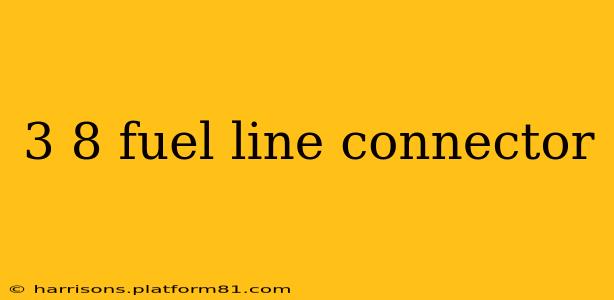Maintaining your vehicle's fuel system is crucial for its safe and efficient operation. A vital component of this system is the fuel line connector, and specifically, the 3/8" fuel line connector, a common size found in many vehicles. This comprehensive guide will explore everything you need to know about this crucial part, from understanding its function to troubleshooting and replacement.
What is a 3/8" Fuel Line Connector?
A 3/8" fuel line connector, as its name suggests, is a connector with a 3/8-inch inner diameter, designed to join sections of fuel lines. These lines carry fuel from the tank to the engine, and any leak or malfunction can have serious consequences. The connector ensures a secure, leak-proof connection, preventing fuel spillage and maintaining the integrity of the fuel delivery system. They are typically made of materials like durable rubber or reinforced plastic, chosen for their resistance to fuel and the pressures within the system.
Why is the 3/8" Size Important?
The 3/8" size is a standard dimension chosen for a balance between fuel flow and line manageability. A larger diameter would allow for greater fuel flow, potentially beneficial for high-performance engines, but may also lead to bulkier and more difficult-to-route lines. Conversely, a smaller diameter could restrict fuel flow, impacting engine performance. The 3/8" size represents a widely adopted compromise that works effectively for many vehicles.
Common Problems with 3/8" Fuel Line Connectors
Several issues can arise with 3/8" fuel line connectors, often leading to fuel leaks or performance problems. These include:
- Cracks or Leaks: Age, exposure to extreme temperatures, or chemical degradation can cause cracks in the connector material, leading to fuel leaks.
- Loose Connections: Vibration or improper installation can loosen the connection, resulting in fuel leakage or reduced fuel flow.
- Corrosion: In some environments, corrosion can affect the metal parts of the connector, compromising the seal and potentially leading to leaks.
- Blockages: Debris or contaminants can sometimes accumulate within the connector, restricting fuel flow and potentially causing engine stalling or poor performance.
How to Identify a Faulty 3/8" Fuel Line Connector
Identifying a problem with your 3/8" fuel line connector often involves visually inspecting the connector and its surrounding area for signs of leaks, damage, or corrosion. Be sure to never work on a fuel system without first disconnecting the battery's negative terminal.
Look for:
- Visible cracks or splits in the connector material.
- Fuel stains or wetness around the connector area.
- Loose or wobbly connections.
- Signs of corrosion on metal components.
- Fuel smell emanating from the area.
Replacing a 3/8" Fuel Line Connector: A Step-by-Step Guide (General Overview)
Replacing a 3/8" fuel line connector is a task best left to experienced mechanics unless you have the proper tools and safety knowledge. Working with fuel systems requires extreme caution due to the fire hazard. This is a general overview; specific procedures will vary depending on your vehicle's make and model.
- Safety First: Disconnect the battery's negative terminal before starting any work.
- Locate the Connector: Identify the faulty connector in the fuel line.
- Drain Fuel: Carefully drain fuel from the affected section of the fuel line.
- Disconnect the Connector: Use the appropriate tools to disconnect the fuel line from the connector.
- Install the New Connector: Connect the new connector securely.
- Reconnect the Fuel Line: Reconnect the fuel lines to the new connector.
- Reconnect the Battery: Reconnect the battery's negative terminal.
- Check for Leaks: Carefully check for any leaks after reconnecting the battery.
What Tools Do I Need to Replace a 3/8" Fuel Line Connector?
The specific tools will depend on your vehicle but may include:
- Wrenches (appropriate sizes)
- Fuel line disconnect tools
- Safety glasses and gloves
- Rags or absorbent material
- A fuel-safe container to catch any spilled fuel
Where Can I Find Replacement 3/8" Fuel Line Connectors?
Replacement 3/8" fuel line connectors are readily available at many auto parts stores, both online and in physical locations. You may need to provide the vehicle's make, model, and year to ensure you get the correct part.
Disclaimer: This information is for educational purposes only and should not be considered professional automotive advice. Always consult a qualified mechanic for any repair or maintenance work involving your vehicle's fuel system. Improper handling of fuel lines can be extremely dangerous.
